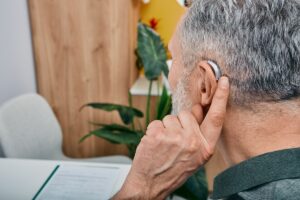Exercise is one of the most important things you can do for your body. It’s a natural stress reliever and can help you stay healthy for a lifetime. Exercise has many health benefits. It helps keep your body strong, improves mood, and even reduces disease risk.
The more active you are, the more benefits you’ll reap, and that’s even the case with your hearing health – a surprising new study shows that exercise may also be good for your hearing.
A study looks at how exercise affects hearing loss.
A study from 2016 that was published in the US-based Journal of Neuroscience looked at mice and how well they could hear. Mice were used in the study because their anatomy, physiology, and genetics are much like people’s.
They looked at the hearing of mice who were very active and mice who were less active and found that less active mice were more likely to have hearing damage. Also, the researchers saw that mice who didn’t exercise lost about 20% of their hearing throughout their lives compared to mice who did exercise.
To get to this conclusion, researchers looked at the parts of the inner ear in mice. The cochlea and the hair-like cells inside (the same structures are also in human ears) send information about sounds from the ear to the brain. In mice that didn’t move much, the researchers also saw damage in the strial capillaries of the cochlea. These capillaries are a big part of how oxygen gets to all aspects of the hearing system. This was important because the cochlear system needs a steady flow of oxygenated blood to work and send sound to the brain so it can be processed.
Research shows that regular exercise helps keep your ears healthy.
Even though it was clear that damage that led to hearing loss was much worse in mice that didn’t exercise, they found that 95% of mice that did exercise had good hearing. This was directly related to healthy inner ears and the many tiny structures that send sound to the brain. Mice that worked out regularly seemed to have less inflammation in their blood vessels and better hearing much later in life.
The strong support that exercise gave to the health of mice’s hearing led researchers to think that regular exercise could also protect the parts of the ear that help us hear.
Keeping an eye on how well seniors hear
Another study coming out of the prestigious US-based Johns Hopkins University examined how often older people exercise. They found that, on average, older people who did low- to moderate-intensity activities at least three hours a week did much better on hearing tests than older people who didn’t do much. The researchers concluded that exercising 30 minutes a day can help almost every part of your health, including your hearing.
When you work out regularly, your body’s inflammation goes down. Researchers think exercise increases blood flow and oxygen throughout your body. Too much inflammation in the body can hurt the stereocilia and capillaries that send sound information to the brain.
The best exercise is the one you’ll do regularly.
Cardiovascular exercises include hiking, jogging, cycling, rowing, running, dancing, and elliptical training. Find one that makes you happy, inspires you, and fits your physical abilities.
Most importantly, remember that cardiovascular activity is any activity that makes you breathe faster and your heart beat faster. Make sure to give your body at least 5 to 10 minutes to get used to the movement at the beginning of each session. This will help your body improve blood flow to your muscles. People often start to look forward to their daily workouts because they make them feel better and may help them stay focused and emotionally healthy during the day.
How to listen in a safe way
Many people like to listen to music while they work out because it helps them get going. But it’s essential to ensure you’re safely listening to your favourite songs. Make sure that the volume of the music you like to listen to while you work out is at most 60% of what it could be. With headphones and loud music, it’s easy to go over 100 dB or more. This can damage your hearing from the noise in just 15 minutes, which is only half of a recommended cardio workout.
Set up a hearing test with us to learn more about hearing loss. We can check your hearing and figure out the best way to help you.

